I’ve come to realize that the main reason I travel is to learn things and to form relationships. The best way to do that is to take your time, get comfortable, re-visit. The following is part 1 of a piece on Toits Rouges, a neighborhood in the Yopougon quartier of Abidjan. I have spent a lot of time in this neighborhood over the past several years. I hope this offers an accurate picture of that place.
When you arrive at the Cinema Boissy intersection, your taxi will descend off a small cliff. It’s hard to imagine where this crater came from, but it’s there and it’s unavoidable. It has been festering since at least 2010.
You will hear many insults at this intersection. Shared taxi drivers are pressed. They make 20-40 cents on every passenger. They need to get rid of their clients and find new ones. They will accelerate towards this intersection, searching for that perfect channel in which they can avoid both bottoming out and downshifting to first gear.
Sometimes drivers try maneuvers that are too ambitious. Sometimes they drive too slow. Once I had a driver that attempted to squeeze between the curb and a teetering truck, but the truck drifted to the right and blocked our path before easing off the cliff like an old man descending a flight of stairs. Our driver was irate. “What is this!! ARE THERE EGGS IN THERE?!?!”
It’s not easy for aging woro woros to recover from this intersection. The clutch squeals. The coins rattle in the ash tray.
But more earth-shaking vibrations await outside of the car; the double-digit decibels of boissy’s maquis, a row of open-air bars, each one flanked by towers of speakers.
It is early evening and the maquis are mostly empty. Women are slicing tomatoes and onions and starting charcoal fires. In a few hours kedjenou will be simmering and the whole block will be perfumed with poulet braisé.
Further down the street, there is a line to buy fried igname and alloco from a vrai dame, a woman that can cut down a group of kids with the slightest measured squint of her eyes, a woman that you’d be wise to address as Madame or La Vieille Mere.
She will smile and address you as ma fille (my daughter) or mon fils (my son) and for 200 CFA (40 cents), you can buy a filling portion of fried plantains smothered in chili and onion.
A good idea would be to take that alloco down to the end of the street. Odile runs a maquis there and she will gladly serve you a liter of beer for $1.40. There is a sandy tree-covered patio, the breeze is constant, and so is Odile’s chatter, which is mostly hilarious neighborhood gossip, with a few words of Baoulé thrown in.
A damp pagne may caress your neck while you enjoy your grosse bière and alloco. Boundaries between properties are vague here and Odile’s neighbors have a clothesline that runs along the back of her patio. They also have a small stand where they sell Mapouka (think Irish cream) and koutoukou, the local moonshine made from palm wine.
Decades ago, the lot across the street was a patch of forest and young boys would form hunting bands to kill snakes and lizards. Now it is a tired apartment building, streaked with mildew. On the ground floor, there is another maquis. On Christmas day, we shared a beer with Maurice here. He was on a date:
It is dusk now and everyone is outside. If you (somehow) tire of Odile’s company, Madou’s kiosk is next door and a crowd is gathering for a Champion’s League match. You sit down next to Jean-Paul, who offers to share his spaghetti with you. On mange, venez faire comme moi, je vous invite – Ivorians have many ways of saying “come and and eat with me.” Learn them, because you should make the same offer when you have your own plate in front of you.
But before you eat (hey, the alloco was just a snack), you should greet the Vieux Pere and the Konate’s. Their houses are separated from Madou’s kiosk by a narrow strip of concrete, broken in places.
Click here to read part II of this story.


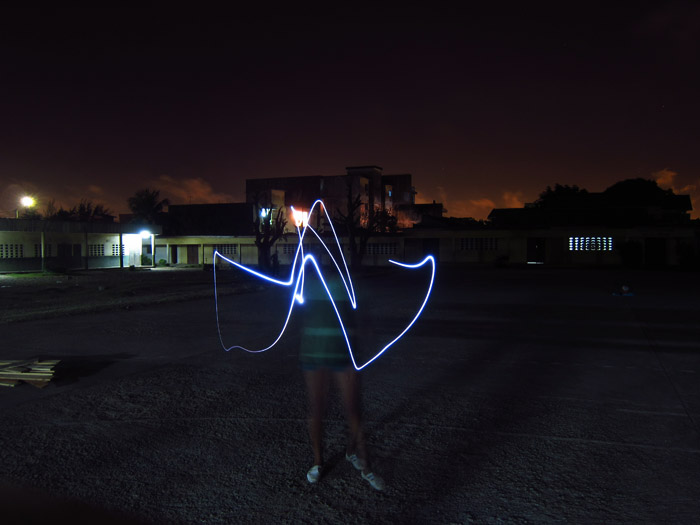
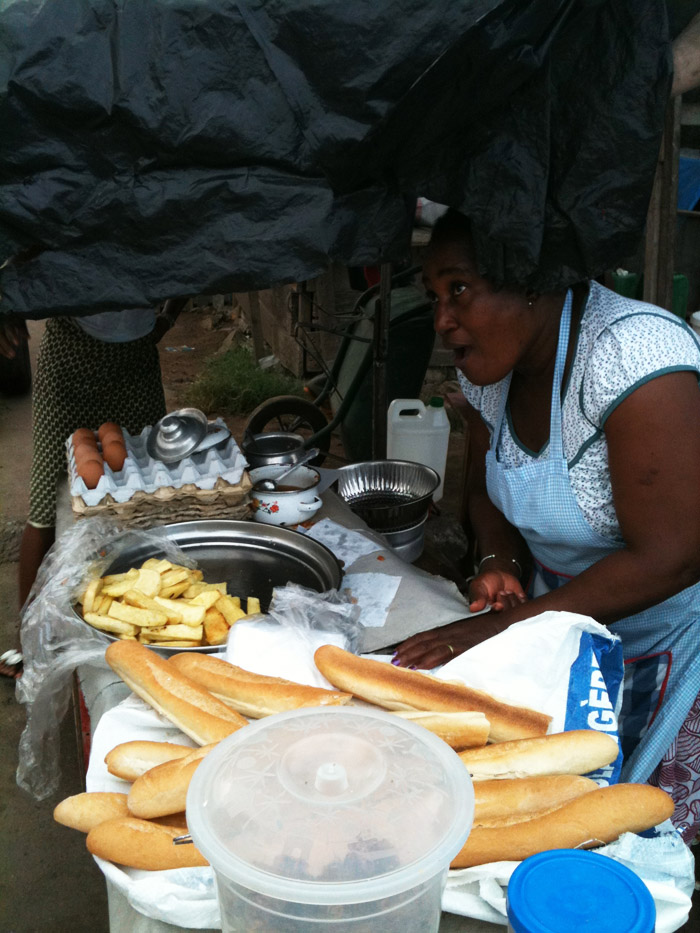
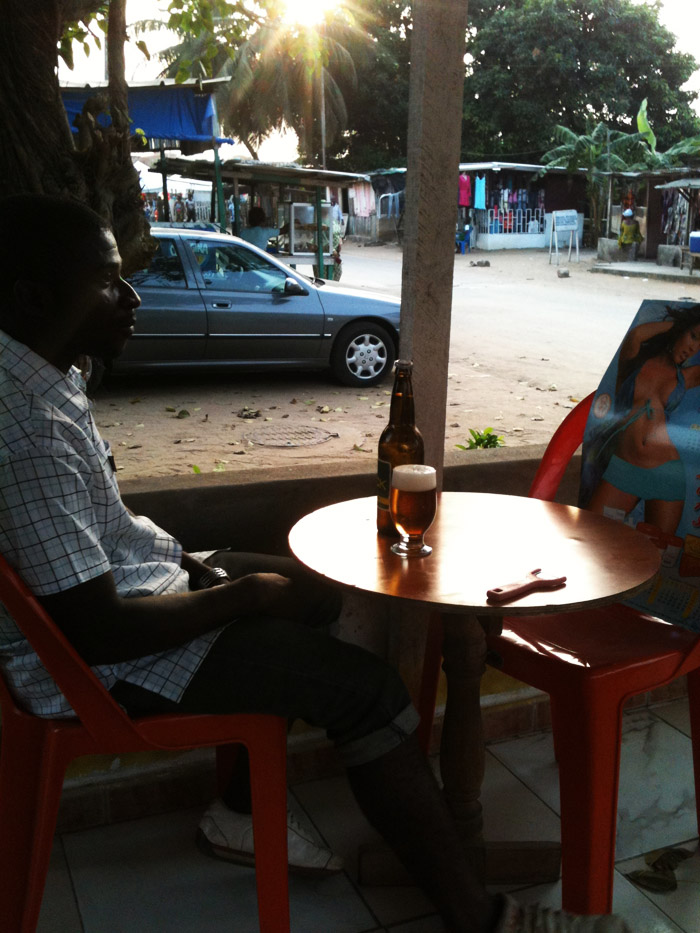
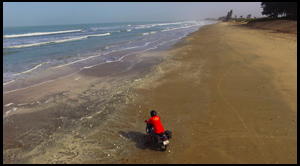
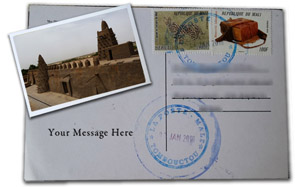
Wonderful picture of Yopougon. I am really amazed by your mastery of ‘Nouchi’, the ivorian french. You’re so well integrated that I feel you’ll be teaching me my own culture very soon.
By the way, what about your business, the restaurant?
hah, thanks. Nouchi is more or less the only French I know! Cote d’Ivoire is where I started speaking French regularly. As far as teaching you your own culture, I don’t think you have to worry about that anytime soon 😉 Restaurant is good! Thanks for asking. Slow and steady, we are making progress.
I love it. I’ve got the feel of the area and the people without ever having been there.
Oh and I returned home this year to a lovely camel who was waiting patiently for me in the lounge! Thankyou.
Thanks, Maggie! And very happy to hear you’ve received your camel!! (I was a bit worried when I sent them out)
Please do not wait a week to post part 2~!! How I would love to be there enjoying a cold one with you, Maurice and his girlfriend!
On mange, venez faire comme moi, je vous invite (I have plenty of Parisian and bigboy ice tea to share).
Bless
Maurice is a real treat. You would love him. I bet you have bigboy iced tea, but where are you getting your Parisians these days, benny???????
Always enjoy these slice of life posts from your experiences in West Africa. Thanks for sharing.
Glad you liked it, Ekua. In general, I enjoy writing these posts more than anything else.
great article! i enjoyed to read it
thanks, renate!
Bloody amazing mate!
thanks!
You took me WAY back to my days in RCI!! Haha, what a laugh. Is there still an “allocodrome” in Deux Plateaux? Thanks for the great post.
nice, glad to hear that!! Yes, there most definitely is!!!